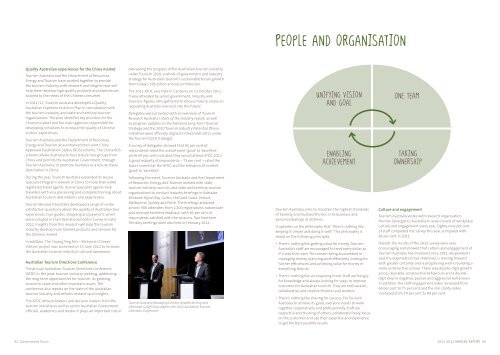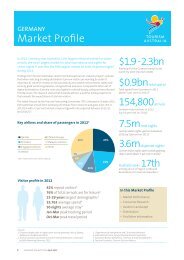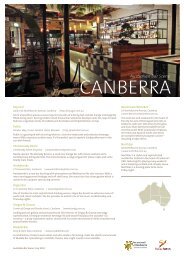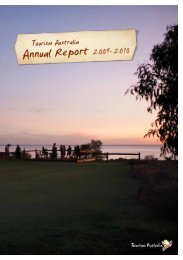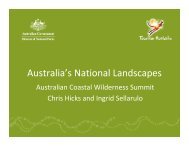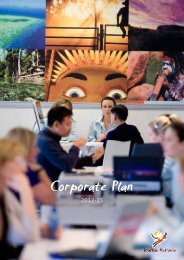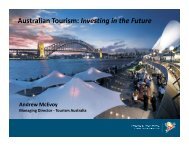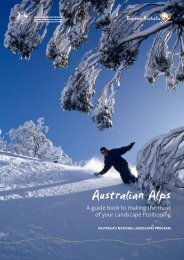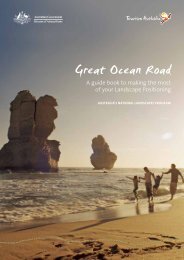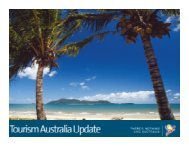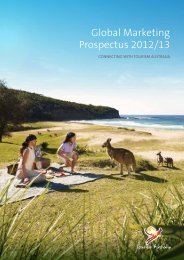2011 - 2012 Annual Report - Tourism Australia
2011 - 2012 Annual Report - Tourism Australia
2011 - 2012 Annual Report - Tourism Australia
You also want an ePaper? Increase the reach of your titles
YUMPU automatically turns print PDFs into web optimized ePapers that Google loves.
People and organisation<br />
Quality <strong>Australia</strong>n experiences for the China market<br />
<strong>Tourism</strong> <strong>Australia</strong> and the Department of Resources,<br />
Energy and <strong>Tourism</strong> have worked together to provide<br />
the tourism industry with research and insights that will<br />
help them develop high-quality products and experiences<br />
tailored to the needs of the Chinese consumer.<br />
In <strong>2011</strong>/12, <strong>Tourism</strong> <strong>Australia</strong> developed a Quality<br />
<strong>Australia</strong>n Experiences Action Plan in consultation with<br />
the tourism industry, and state and territory tourism<br />
organisations. The plan identifies key priorities for the<br />
Chinese market and the main agencies responsible for<br />
developing initiatives to increase the quality of Chinese<br />
visitors’ experiences.<br />
<strong>Tourism</strong> <strong>Australia</strong> and the Department of Resources,<br />
Energy and <strong>Tourism</strong> also enhanced their joint China<br />
Approved Destination Status (ADS) scheme. The China ADS<br />
scheme allows <strong>Australia</strong> to host leisure tour groups from<br />
China and permits the <strong>Australia</strong>n Government, through<br />
<strong>Tourism</strong> <strong>Australia</strong>, to promote <strong>Australia</strong> as a leisure travel<br />
destination in China.<br />
overseeing the progress of the <strong>Australia</strong>n tourism industry<br />
under <strong>Tourism</strong> 2020, a whole-of-government and industry<br />
strategy for <strong>Australia</strong>n tourism’s sustainable future growth<br />
from today’s $96 billion annual contribution.<br />
The <strong>2011</strong> ATDC was held in Canberra on 13 October <strong>2011</strong>.<br />
It was attended by senior government, industry and<br />
business figures, who gathered to discuss how to create an<br />
‘appealing <strong>Australia</strong> now and into the future’.<br />
Delegates were provided with an overview of <strong>Tourism</strong><br />
Research <strong>Australia</strong>’s State of the Industry report, as well<br />
as progress updates on the National Long-Term <strong>Tourism</strong><br />
Strategy and the 2020 <strong>Tourism</strong> Industry Potential (these<br />
initiatives were officially aligned in December <strong>2011</strong> under<br />
the <strong>Tourism</strong> 2020 strategy).<br />
A survey of delegates showed that 82 per cent of<br />
respondents rated the overall event ‘good’ to ‘excellent’,<br />
while 69 per cent indicated they would attend ATDC <strong>2012</strong>.<br />
A good majority of respondents – 73 per cent – rated the<br />
topics covered at the ATDC and the relevance of content<br />
‘good’ to ‘excellent’.<br />
Unifying Vision<br />
and Goal<br />
Enabling<br />
Achievement<br />
One Team<br />
Taking<br />
Ownership<br />
During the year, <strong>Tourism</strong> <strong>Australia</strong> expanded its Aussie<br />
Specialist Program network in China to more than 6,000<br />
registered travel agents. Aussie Specialist agents help<br />
travellers with visa processing and complete training about<br />
<strong>Australia</strong>n tourism destinations and experiences.<br />
<strong>Tourism</strong> Research <strong>Australia</strong> developed a range of visitor<br />
satisfaction questions about the quality of <strong>Australia</strong>n tour<br />
experiences, tour guides, shopping and payment, which<br />
were included in the International Visitor Survey in early<br />
<strong>2012</strong>. Insights from this research will help the tourism<br />
industry develop more tailored products and services for<br />
the Chinese market.<br />
In addition, The ‘Huang Ying Nin – Welcome Chinese<br />
Visitors’ project was launched on 13 June <strong>2012</strong> to increase<br />
the <strong>Australia</strong>n tourism industry’s cultural awareness.<br />
<strong>Australia</strong>n <strong>Tourism</strong> Directions Conference<br />
The annual <strong>Australia</strong>n <strong>Tourism</strong> Directions Conference<br />
(ATDC) is the peak tourism industry meeting, addressing<br />
the long-term opportunities for tourism, its growing<br />
economic value and other important issues. The<br />
conference also reports on the state of the <strong>Australia</strong>n<br />
tourism industry and delivers research and insights.<br />
The ATDC attracts leaders and decision makers from the<br />
tourism industry as well as senior <strong>Australia</strong>n Government<br />
officials, academics and media. It plays an important role in<br />
Following the event, <strong>Tourism</strong> <strong>Australia</strong> and the Department<br />
of Resources, Energy and <strong>Tourism</strong> worked with state<br />
tourism industry councils, and state and territory tourism<br />
organisations to conduct industry briefings in Adelaide,<br />
Brisbane, Byron Bay, Cairns, the Gold Coast, Hobart,<br />
Melbourne, Sydney and Perth. The briefings attracted<br />
almost 900 attendees from 1,200 registrations nationwide<br />
and received excellent feedback, with 85 per cent of<br />
respondents satisfied with the sessions. Two Northern<br />
Territory briefings were also held in February <strong>2012</strong>.<br />
<strong>Tourism</strong> <strong>Australia</strong> Managing Director Andrew McEvoy and<br />
Chairman Geoff Dixon address the <strong>2011</strong> <strong>Australia</strong>n <strong>Tourism</strong><br />
Directions Conference<br />
<strong>Tourism</strong> <strong>Australia</strong> aims to maintain the highest standards<br />
of honesty and trustworthiness in its business and<br />
personal dealings at all times.<br />
It operates on the philosophy that ‘There’s nothing like<br />
keeping it simple and doing it well!’ This philosophy is<br />
based on the following principles:<br />
• There’s nothing like getting value for money. <strong>Tourism</strong><br />
<strong>Australia</strong>’s staff are encouraged to treat every dollar as<br />
if it was their own. This means being accountable in<br />
managing money, planning work effectively, looking for<br />
further efficiencies and achieving value for money in<br />
everything they do<br />
• There’s nothing like an enquiring mind. Staff are hungry<br />
for knowledge and always looking for ways to improve<br />
outcomes for <strong>Australia</strong>n tourism. They are enthusiastic,<br />
collaborative and creative thinkers and workers<br />
• There’s nothing like sharing for success. For <strong>Tourism</strong><br />
<strong>Australia</strong> to achieve its goals, everyone needs to work<br />
together cooperatively and professionally. Staff are<br />
respectful and trusting of others, collaborate freely, focus<br />
on the customer, and use their expertise and experience<br />
to get the best possible results<br />
Culture and engagement<br />
<strong>Tourism</strong> <strong>Australia</strong> works with research organisation<br />
Human Synergistics <strong>Australia</strong> to assess levels of workplace<br />
culture and engagement every year. Eighty-nine per cent<br />
of staff completed the survey this year, compared with<br />
86 per cent in <strong>2011</strong>.<br />
Overall, the results of the <strong>2012</strong> survey were very<br />
encouraging and showed that culture and engagement at<br />
<strong>Tourism</strong> <strong>Australia</strong> has improved since <strong>2011</strong>. Respondents<br />
said the organisation has stabilised, is moving forward<br />
with greater certainty and is progressing well in building a<br />
more constructive culture. There was double-digit growth<br />
across desirable, constructive behaviours and a doubledigit<br />
drop in negative, passive and aggressive behaviours.<br />
In addition, the staff engagement index increased from<br />
69 per cent to 75 per cent and the role clarity index<br />
increased from 79 per cent to 84 per cent.<br />
42 Government Focus <strong>2011</strong>-<strong>2012</strong> ANNUAL REPORT 43


